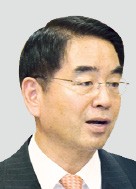KIC may cancel $50 mn contract with Elliott over US fund’s disputes with Korean govt
May 17, 2018 (Gmt+09:00)
LG Chem to sell water filter business to Glenwood PE for $692 million


Kyobo Life poised to buy Japan’s SBI Group-owned savings bank


KT&G eyes overseas M&A after rejecting activist fund's offer


StockX in merger talks with Naver’s online reseller Kream


Mirae Asset to be named Korea Post’s core real estate fund operator


Korea Investment Corporation (KIC) is looking into whether Elliott Management’s recent move against the South Korean government constitutes a conflict of interest with the sovereign fund, and may cancel its $50 million entrustment contract with the US activist fund despite its strong performance, its chief executive said on May 17.
KIC, with $134 billion of AUM, is also closely monitoring South Korean prosecutors’ investigation into allegations that Elliott Management Corp. breached disclosure rules during its purchase of Samsung C&T shares in 2015.
Elliott is seeking compensation from the South Korean government, arguing that it suffered investment losses because of the government’s intervention in the 2015 merger of two Samsung units: Samsung C&T Corporation and Cheil Industries Inc. The US fund opposed the merger, but narrowly failed to block it.
“If the US hedge fund Elliott Management is involved in an issue which causes a conflict of interest of the South Korean government, or found to have violated a law, we will consider cancelling our contract,” Heenam Choi, KIC’s chief executive, told reporters on May 17.

KIC allocated $50 million to Elliott in 2010 when the sovereign wealth fund made its first investment in a hedge fund. It is among the world’s top-performing hedge funds over the past eight years, said Shinwoo Kang, KIC’s chief investment officer.
Under the entrustment contract, KIC is allowed to terminate the agreement and Elliott is required to return the committed capital to KIC, in case the US fund invests 5% or above of its fund’s AUM in South Korean assets; it is involved in a conflict of interest with KIC; or it violates a law.
“There are no problems with the proportion of its South Korean investments because it is negligible, but we’re looking minutely into whether they are involved in a conflict of interest and violated a law,” Choi said in its first news conference after taking helm at KIC in March.
The finance ministry and the Bank of Korea had entrusted $75 billion and $25 billion to KIC, respectively.
The disputes with the South Korean government came as Elliott also increased pressure on Hyundai Motor Group in April to simplify its ownership structure.
INVESTMENT RETURNS
In 2017, KIC’s investment return leapt to 16.42% from 4.35% a year earlier, thanks to strong equity markets.
Its AUM, including investment returns, expanded to $134.1 billion at end-2017, from $110.8 billion.
KIC aims to boost AUM to over $200 billion by 2020, including expected net investment returns of over $25 billion.
The projection is based on its annualized target returns of 5-6% by expanding the pool of outside management companies and making long-term investment.
It plans to lift the proportion of alternative investments to around 19% by 2020, from 14.4% at end-2017. But the proportion of each asset class within the alternative investment segment will remain steady, according to Kang.

Further, KIC seeks to attract additional investment assets from the finance ministry and the Bank of Korea, as well as South Korean pension fuds. Under the KIC Act revised in 2016, domestic pension funds are allowed to entrust assets to KIC.
By Chang Jae Yoo
yoocool@hankyung.com
Yeonhee Kim edited this article
-
 Real estateMirae Asset to be named Korea Post’s core real estate fund operator
Real estateMirae Asset to be named Korea Post’s core real estate fund operatorApr 29, 2025 (Gmt+09:00)
-
 Asset managementMirae Asset bets on China as Korean investors’ US focus draws concern
Asset managementMirae Asset bets on China as Korean investors’ US focus draws concernApr 27, 2025 (Gmt+09:00)
-
 Alternative investmentsMeritz backs half of ex-manager’s $210 mn hedge fund
Alternative investmentsMeritz backs half of ex-manager’s $210 mn hedge fundApr 23, 2025 (Gmt+09:00)
-
 Real estateRitz-Carlton to return to Seoul, tapped by IGIS Asset for landmark project
Real estateRitz-Carlton to return to Seoul, tapped by IGIS Asset for landmark projectApr 22, 2025 (Gmt+09:00)
-
 Real estateS.Korean gaming giant Netmarble eyes headquarters building sale
Real estateS.Korean gaming giant Netmarble eyes headquarters building saleApr 18, 2025 (Gmt+09:00)


